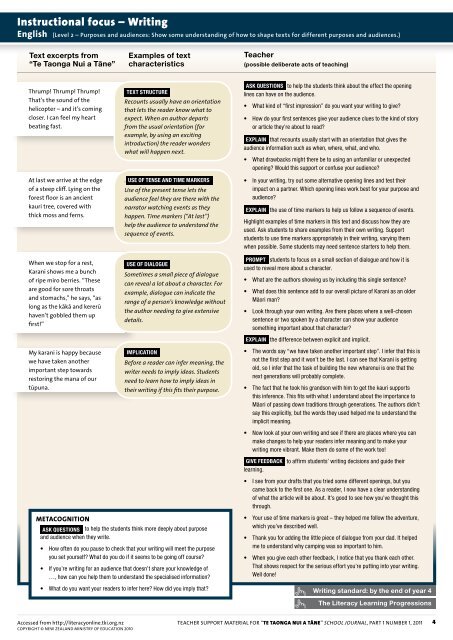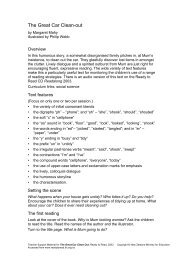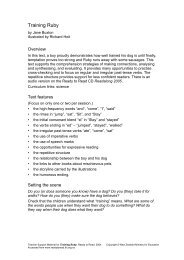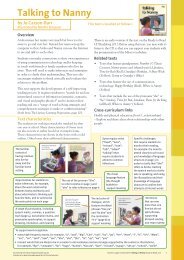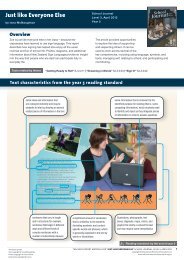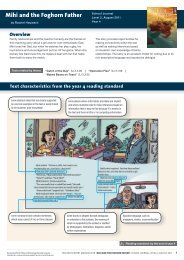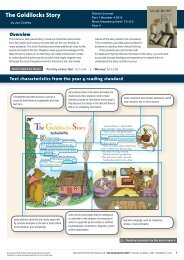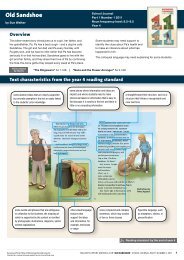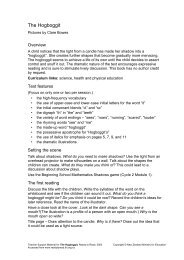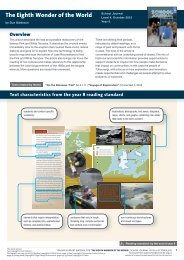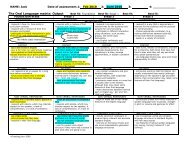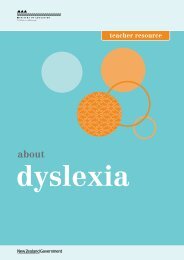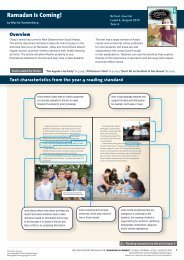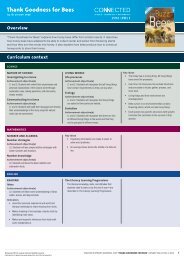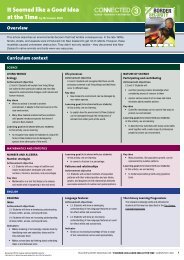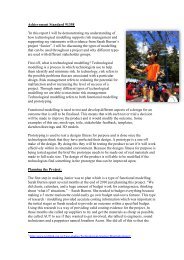Te Taonga Nui a Tane - Literacy Online
Te Taonga Nui a Tane - Literacy Online
Te Taonga Nui a Tane - Literacy Online
Create successful ePaper yourself
Turn your PDF publications into a flip-book with our unique Google optimized e-Paper software.
Instructional focus – Writing<br />
English (Level 2 – Purposes and audiences: Show some understanding of how to shape texts for different purposes and audiences.)<br />
<strong>Te</strong>xt excerpts from<br />
“<strong>Te</strong> <strong>Taonga</strong> <strong>Nui</strong> a Tāne”<br />
Examples of text<br />
characteristics<br />
<strong>Te</strong>acher<br />
(possible deliberate acts of teaching)<br />
Thrump! Thrump! Thrump!<br />
That’s the sound of the<br />
helicopter – and it’s coming<br />
closer. I can feel my heart<br />
beating fast.<br />
At last we arrive at the edge<br />
of a steep cliff. Lying on the<br />
forest floor is an ancient<br />
kauri tree, covered with<br />
thick moss and ferns.<br />
When we stop for a rest,<br />
Karani shows me a bunch<br />
of ripe miro berries. “These<br />
are good for sore throats<br />
and stomachs,” he says, “as<br />
long as the kākā and kererū<br />
haven’t gobbled them up<br />
first!”<br />
My karani is happy because<br />
we have taken another<br />
important step towards<br />
restoring the mana of our<br />
tūpuna.<br />
TEXT STRUCTURE<br />
Recounts usually have an orientation<br />
that lets the reader know what to<br />
expect. When an author departs<br />
from the usual orientation (for<br />
example, by using an exciting<br />
introduction) the reader wonders<br />
what will happen next.<br />
. Use of tense and time markers<br />
Use of the present tense lets the<br />
audience feel they are there with the<br />
narrator watching events as they<br />
happen. Time markers (“At last”)<br />
help the audience to understand the<br />
sequence of events.<br />
Use of dialogue<br />
Sometimes a small piece of dialogue<br />
can reveal a lot about a character. For<br />
example, dialogue can indicate the<br />
range of a person’s knowledge without<br />
the author needing to give extensive<br />
details.<br />
Implication<br />
Before a reader can infer meaning, the<br />
writer needs to imply ideas. Students<br />
need to learn how to imply ideas in<br />
their writing if this fits their purpose.<br />
Ask questions to help the students think about the effect the opening<br />
lines can have on the audience.<br />
• What kind of “first impression” do you want your writing to give?<br />
• How do your first sentences give your audience clues to the kind of story<br />
or article they’re about to read?<br />
Explain that recounts usually start with an orientation that gives the<br />
audience information such as when, where, what, and who.<br />
• What drawbacks might there be to using an unfamiliar or unexpected<br />
opening? Would this support or confuse your audience?<br />
• In your writing, try out some alternative opening lines and test their<br />
impact on a partner. Which opening lines work best for your purpose and<br />
audience?<br />
Explain the use of time markers to help us follow a sequence of events.<br />
Highlight examples of time markers in this text and discuss how they are<br />
used. Ask students to share examples from their own writing. Support<br />
students to use time markers appropriately in their writing, varying them<br />
when possible. Some students may need sentence starters to help them.<br />
Prompt students to focus on a small section of dialogue and how it is<br />
used to reveal more about a character.<br />
• What are the authors showing us by including this single sentence?<br />
• What does this sentence add to our overall picture of Karani as an older<br />
Māori man?<br />
• Look through your own writing. Are there places where a well-chosen<br />
sentence or two spoken by a character can show your audience<br />
something important about that character?<br />
Explain the difference between explicit and implicit.<br />
• The words say “we have taken another important step”. I infer that this is<br />
not the first step and it won’t be the last. I can see that Karani is getting<br />
old, so I infer that the task of building the new wharenui is one that the<br />
next generations will probably complete.<br />
• The fact that he took his grandson with him to get the kauri supports<br />
this inference. This fits with what I understand about the importance to<br />
Māori of passing down traditions through generations. The authors didn’t<br />
say this explicitly, but the words they used helped me to understand the<br />
implicit meaning.<br />
• Now look at your own writing and see if there are places where you can<br />
make changes to help your readers infer meaning and to make your<br />
writing more vibrant. Make them do some of the work too!<br />
Give feedback to affirm students’ writing decisions and guide their<br />
learning.<br />
• I see from your drafts that you tried some different openings, but you<br />
came back to the first one. As a reader, I now have a clear understanding<br />
of what the article will be about. It’s good to see how you’ve thought this<br />
through.<br />
Metacognition<br />
Ask questions to help the students think more deeply about purpose<br />
and audience when they write.<br />
• How often do you pause to check that your writing will meet the purpose<br />
you set yourself? What do you do if it seems to be going off course?<br />
• If you’re writing for an audience that doesn’t share your knowledge of<br />
…, how can you help them to understand the specialised information?<br />
• What do you want your readers to infer here? How did you imply that?<br />
• Your use of time markers is great – they helped me follow the adventure,<br />
which you’ve described well.<br />
• Thank you for adding the little piece of dialogue from your dad. It helped<br />
me to understand why camping was so important to him.<br />
• When you give each other feedback, I notice that you thank each other.<br />
That shows respect for the serious effort you’re putting into your writing.<br />
Well done!<br />
Writing standard: by the end of year 4<br />
The <strong>Literacy</strong> Learning Progressions<br />
Accessed from http://literacyonline.tki.org.nz<br />
Copyright © New Zealand Ministry of Education 2010<br />
<strong>Te</strong>acher support material for “TE TAONGA NUI A TĀNE” School Journal, Part 1 Number 1, 2011 4


